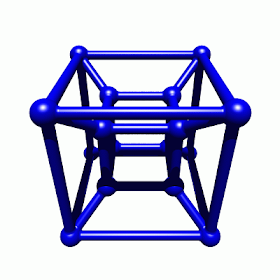
We know that we live in, at a minimum, three dimensions of space and one of time, but what about a fifth dimension, to whit, an additional spacial dimension?
Theodor Kaluza in 1919 found that Einstein's General Theory of Relativity worked perfectly in such a 5D Universe. From Wiki:
"In April 1919 Kaluza noticed that when he solved Albert Einstein's equations for general relativity using five dimensions, then James Clark Maxwell's equations for electromagnetism emerged spontaneously. Kaluza wrote to Einstein who, in turn, encouraged him to publish. Kaluza's theory was published in 1921 in a paper, "Zum Unitätsproblem der Physik" with Einstein's support in "Sitzungsberichte Preussische Akademie der Wissenschaften"
The expansion of space, notably Inflation and Dark Energy, would be well-explained if such an extra dimension existed.
Randall & Sundrum's 5D gravity brane theory would also be validated, and a clear explanation of Gravity would be noted. (Read Lisa Randall's wonderful book "Warped Passages" for more on this)
So if such a thing exists, why can't we see this "fifth" dimension?
I submit we do see it, but we're embedded in it as is everything around us, so we don't notice it.
I submit it is a variable as far as the Universe as a whole is concerned, but a constant to each of us personally given the small region we inhabit and our short lifespans.
Consider what a 4th spacial dimension would be, based on what we know of the first three:
1st Spatial Dimension: forward-back
perpendicular to which is:
2nd Spatial Dimension: right-left
perpendicular to which is:
3rd Spatial Dimension: up-down
perpendicular to which is:
4th Spatial Dimension: out-in, but not grow-shrink, as out-in are the directions, and grow-shrink is what happens when we move along them

A tesseract is a hypercube, a shape that consists of a cube within a cube, joined by lines at the corners. This implies expansion and shrinkage.
String theory has gone too far in exploring up to 11 dimensions.
5D is likely more that sufficient to describe our Universe.
Rudy Rucker (1946- ), author of "The Fourth Dimension" (1984)
Ted Kaluza (1885-1954)


out in isn't really what the tesseract implies. it's more the fact that 2 cubes are conjoined to represent the different perspectives that a 4th dimension entity would have on such a cube
ReplyDeletehttp://www.youtube.com/watch?v=uDaKzQNlMFw&list=LLLWu03ODSIuXkqCt41zRELA&index=1&feature=plpp_video
but I like your theory anyway. neither is necessarily right, since they're both theories.